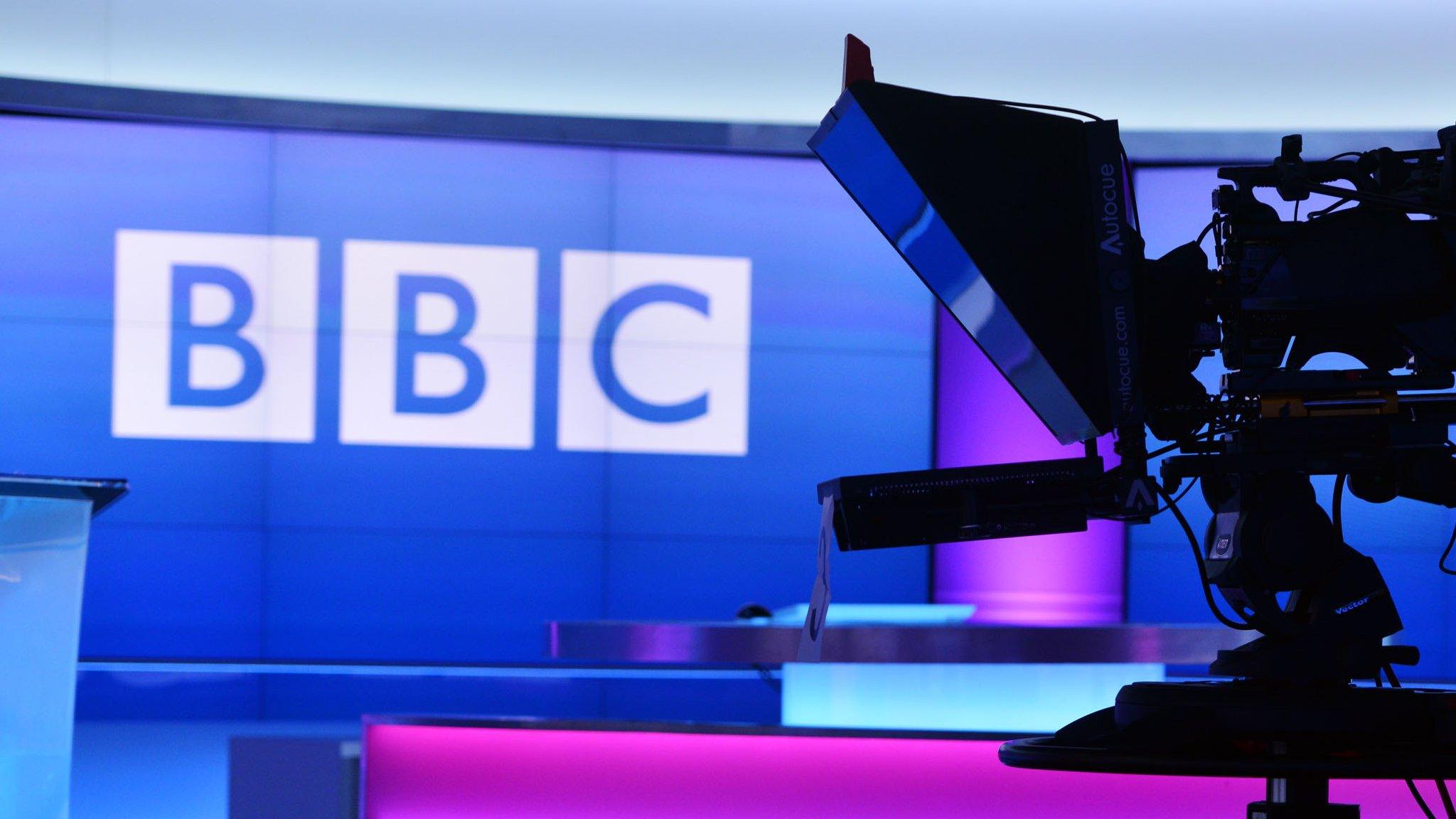Ferguson shipyard: government adviser was against nationalisation
- Published
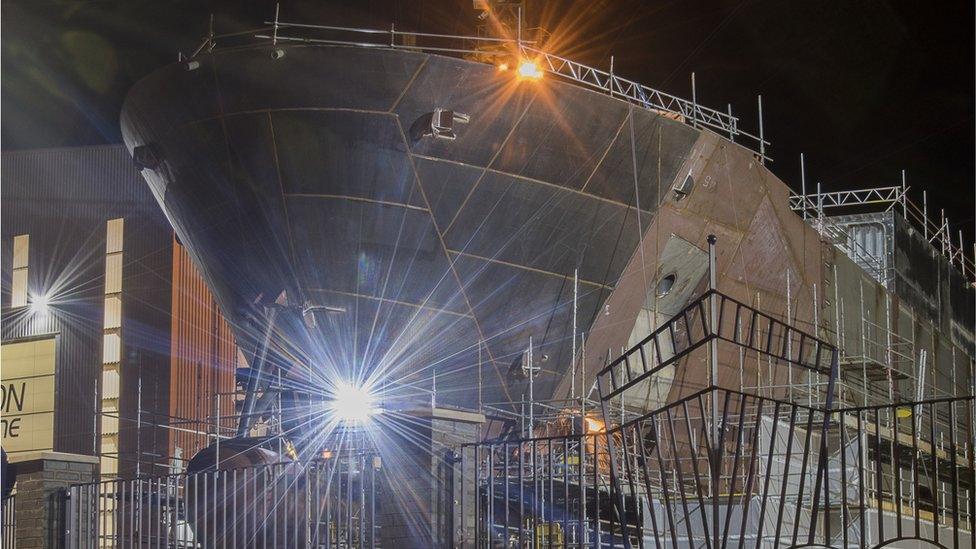
Work on Glen Sannox fell way behind schedule with Ferguson blaming repeated design changes
Administrators at Ferguson shipyard have gained approval for their plan to hand it over to the Scottish government.
However, it's now clear that the adviser to the Scottish government was against nationalisation.
There was repeated advice to move to arbitration in the battling between the government's quango and Ferguson shipyard, but it came to nothing.
Another deadline set for the end of October - because there is life beyond Brexit - is an update from economy secretary Derek Mackay on the cost and delivery schedule for two Cal-Mac ferries.
They are already late. And administration for the Ferguson shipyard in Port Glasgow, where they remain far from finished, has delayed the process.
The contract price, as you may recall, was £97m. The likely cost, according to Jim McColl, the industrial tycoon who lost control of Ferguson two months ago, looks more like double that, and rising.
The Scottish government is already deeply enmeshed in the finances, with around £130m in costs already spent. It has been paying the bills to keep the workforce in place since administration in August.
The way was cleared for nationalisation on 24 October, with creditors' approval for the nationalisation plan. Mr McColl had looked at ways to join with an international shipbuilding firm in buying back the assets, but says he was not given sufficient time to prepare the business case. However, don't expect him to steam away quietly.
He has said he is willing to stay involved, even if the Scottish government takes full ownership.
There are projects he began there, including pioneering design of hydrogen-fuelled ferries, and a part in the next generation of Royal Navy frigates.
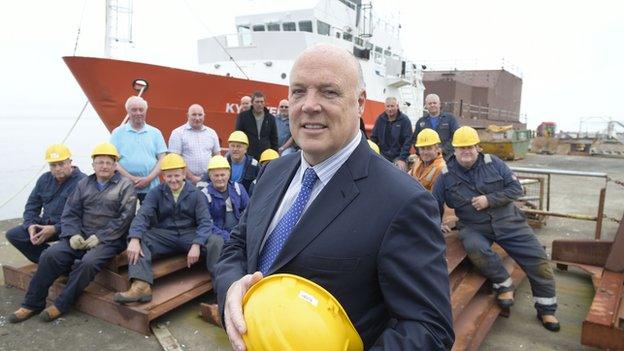
Jim McColl stepped in to rescue the shipyard in 2014
But that doesn't mean he's keen to make nice with the Scottish government. Evidence became public earlier this month, indicating at least some of what went wrong with the contract.
It is evidence that looks troubling for the government and its ship procuring company, Caledonian Maritime Asset Ltd (CMAL), as this expensive saga sets course from state ownership towards a parliamentary inquiry.
Arbitrate
To Derek Mackay, the action taken to nationalise the Ferguson yard in Port Glasgow is justified by the need to finish two CalMac ferries and to retain more than 300 jobs at the yard.
But the evidence now shows the adviser appointed by the Scottish government, Luke van Beek, made it clear that nationalisation was not the cheapest or fastest way to get the ferries finished.
Arbitration was recommended, repeatedly, but documentation shows that advice was ignored. Again and again, calls to the Scottish government to improve relations between the quango-customer and the shipyard management appear to have come to nothing.
And on reading the advice of Mr van Beek, Jim McColl is now even angrier that his calls for arbitration were not heeded by ministers.
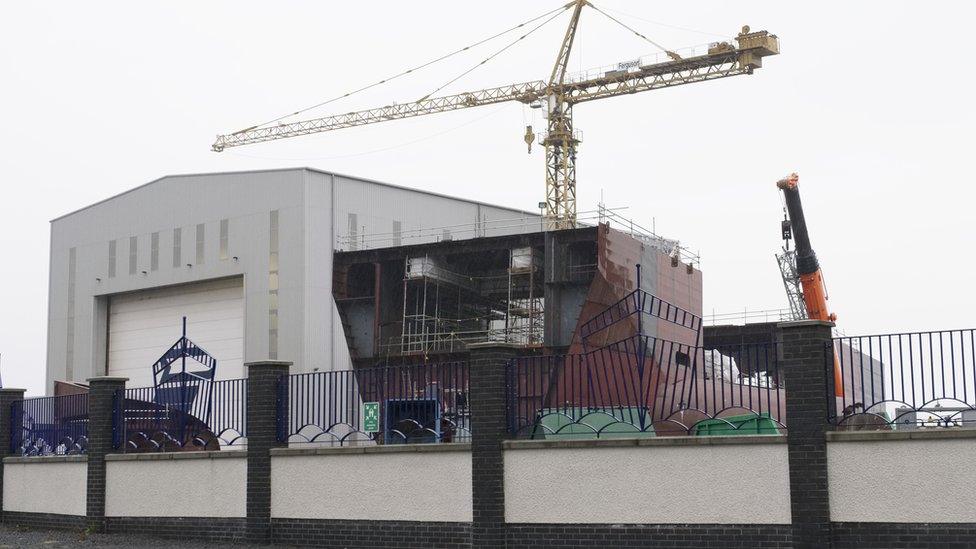
Jim McColl hoped his investment in the Ferguson yard would lead to a rebirth of Clyde shipbuilding
He responded to the revelations, first published in the Sunday Times, with a renewed attack on ministers.
"The damaging CMAL contract, coupled with the Scottish government's unwillingness to take a strong leadership role, has led to the grave difficulties the business is currently experiencing," he said.
"Sadly, the nationalisation of the shipyard has killed off the opportunity for the rebirth of commercial shipbuilding on the Clyde and severely damaged the long-term impact on local jobs and the economy."
The Scottish government takes a different view. Said a spokesman: "We have been working for over two years to find a resolution to the difficulties at Ferguson Marine and our preference has always been to identify commercial options to address the contractual issues, keep the yard going and to finish the vessels.
"A range of independent expert advice and proposals made by the business have been considered in our efforts to resolve the matter and FMEL were free to take their claim to court at any point."
That, says Jim McColl, is disingenuous. He claims that, in reality, he could not.
The government spokesman concluded: "In the absence of a workable commercial solution the administrators of Fergusons have concluded the proposal of ministers to bring the yard into public ownership is now in the best interests of the creditors."
Poor relationship
The inevitable inquiry will surely look into the role of Mr van Beek, a retired naval commander chosen by the Scottish government to monitor progress on the CalMac ferries. He was hired to advise on the drawdown of £45m in exceptional loan funds - Project Poseidon - being provided to Ferguson Marine Engineering Ltd (FMEL) by the Scottish government.
His reports, released in response to a Freedom of Information request, show confidence in FMEL's handling of the project. Even as things were at their worst stage, there was a threat to Ferguson of breach of contract and the cash crisis was heading for the rocks, Mr van Beek told ministers that the factors leading to the position earlier this year, when there was no schedule for finishing the ships, was "beyond FMEL's control".
But he confirms the concerns since made public by Jim McColl about the role of CMAL, a company wholly owned by the Scottish government, with the role of procuring and leasing ships to CalMac and running its port facilities.
The adviser flagged up the effect of too many changes being required to the design, also confirming concerns since raised by the industrialist.
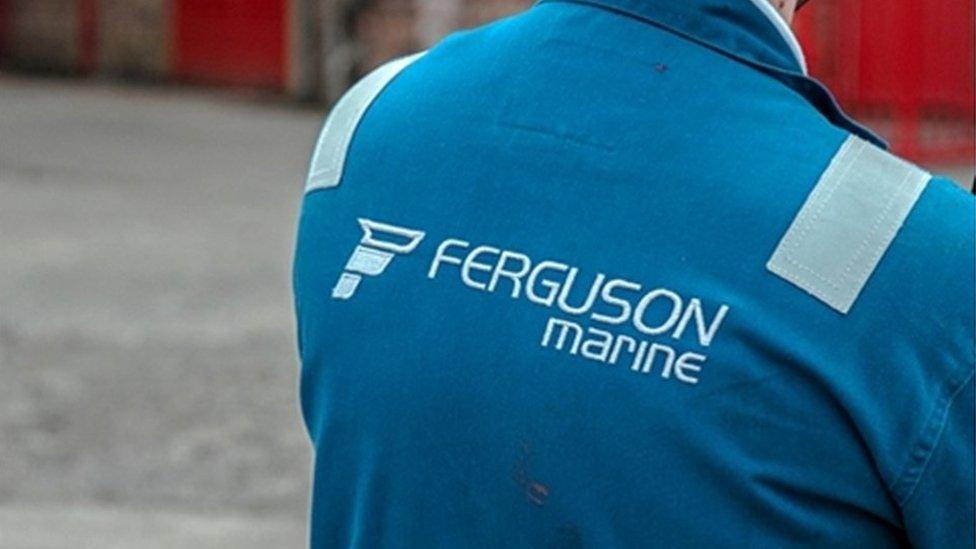
The documents reveal how financing problems led to a loss of skilled sub-contractors
The documents make it clear that the exceptionally large Scottish government loans secured by Ferguson shipyard were not for modernising the yard, as claimed by the Scottish government. They were, we now know, necessary to ensure work continued on the CalMac ships. Delays in approving the loans had led to the project timetable slipping.
On at least two occasions, sub-contractors left because of a lack of money to pay them, and the project was knocked off course by the delay in getting them re-employed. With work available to them elsewhere, there was a loss of expertise as a result.
In October last year, Mr van Beek wrote: "I have no significant concerns on progress on ferries 801 and 802 [as the hulls were known, the first one now called the Glen Sannox]. As far as sustainability of FMEL is concerned the adverse publicity has the potential to severely affect their ability to win future work and the poor relationship with CMAL (it is difficult not to make a link between these concerns) is unhelpful.
"I remain confident that an operational date of July 2019 can be achieved for 801 and that 802 will be launched around the same time." Clearly, that confidence was misplaced.
Risk debate
A month later, an update report carried more concern about the problems of a lack of cash meaning that sequencing of the build process had broken down. Vital items of equipment had not been bought.
By that time, the delay looked like four to five months. And with sub-contractors walking away because they weren't being paid, there was a reminder that the previous time this happened, in summer 2018, it took six weeks of negotiation to regain momentum.
One of the key complications behind this contract has been the design and build of a new hybrid engine, using both liquefied natural gas (LNG) and diesel. The use of LNG is intended to reduce emissions, though there are doubts that it does so when used over short sea crossings.
The infrastructure is not in place for the LNG to be loaded onto the ferries, and was not expected to be available until at least two years into the ferries' operations. During that time, they would have to use only diesel.
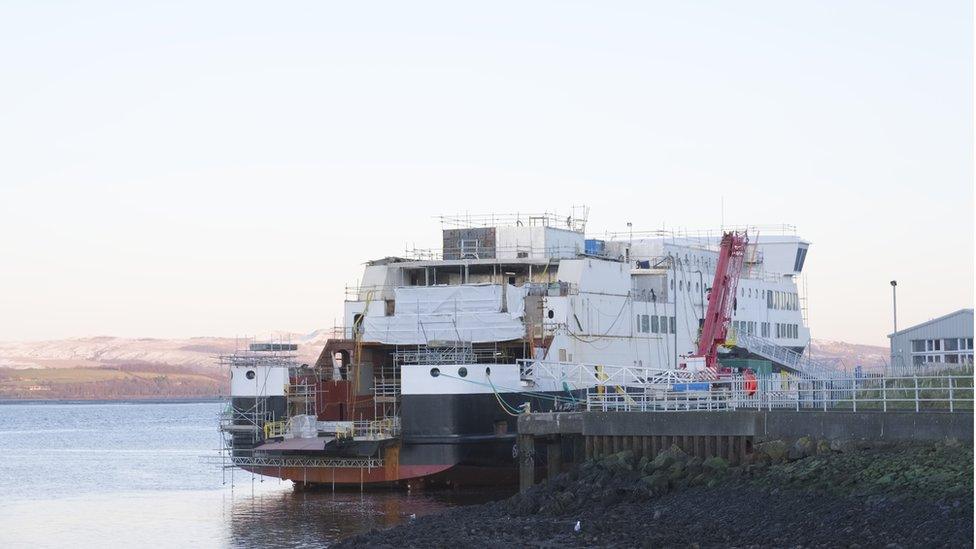
The Glen Sannox vessel has been awaiting completion at the yard since its launch
So concerns were raised that all the effort being put into commissioning LNG on the first of the ferries was pointless, as it would have to be repeated when the LNG option becomes available. Avoiding that process would have saved four weeks of expensive operations.
By November last year, relations with CMAL were, again, a source of tension. There was an opportunity to engage the procurement agency "in the programme and risk debate," said the Scottish government's adviser.
"If this is to work, it must be a willing partner rather than the adversarial situation that appears to exist currently. This would allow for some 'give and take', which is essential during the commissioning phase".
The advice to ministers was repeated and clear: get this relationship sorted. If there was any response and pressure placed on CMAL by its owner, the Scottish government, there's no evidence it had any effect.
By late January of this year, there were some improvements, but not enough. By that time, Jim McColl was taking legal action over the dispute.
The adviser, Mr van Beek, wrote: "I suggest that the poor (and probably deteriorating) relationship with CMAL continues to be a significant risk to the programme".
Sorting that was one of his recommendations, along with simplification of the project and a freeze to all design changes.
Yet two months later, in March this year, there was the same advice offered, with a greater sense of urgency: freeze changes to the design of the first ship, and simplify the build "through an open discussion".
It was clear Transport Scotland, on behalf of the Scottish government had directed that discussions should take place to ease pressures on the programmes, and yet in a critical six-week period, that had not happened.
"In my opinion, with experience of all three of these options, arbitration offers the lowest price increase and the shortest time delay to ferry delivery," wrote Mr van Beek. "It also avoids any long-term government involvement in the shipyard whilst allowing work to continue."
Why was nothing done along those lines, and at such great potential cost? CMAL isn't saying, for now, though there is a claim reported in The Times that Jim McColl's company was "out of its depth". Neither is the Scottish government offering an explanation. MSPs will surely push for answers.
The people of Arran, Harris and Uist will continue to push to get long overdue ship replacements, along with the other island communities who depend on CMAL working with the only Scottish shipyard suited to building their lifeline ferries.
- Published24 October 2019
